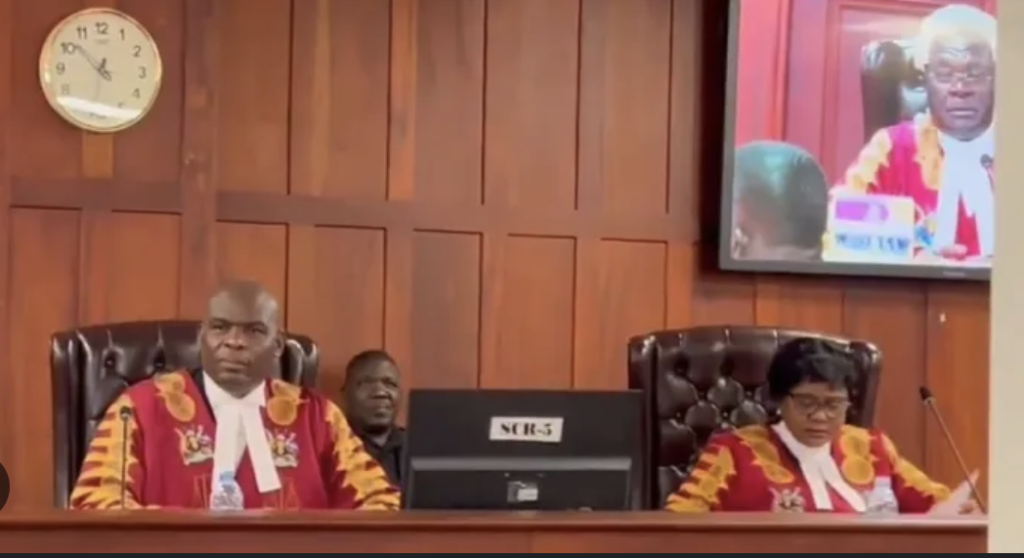Uganda’s Supreme Court bans military trials for civilians; government rejects ruling

Uganda’s recent Supreme Court ruling, which declared that civilians should not be tried in military courts, has been widely welcomed by human rights organisations and legal experts who view the decision as a critical step toward ensuring the protection of fundamental rights.
The Case Against Military Courts
The case that led to the Supreme Court’s ruling began with Michael Kabaziguruka, a former Member of Parliament who was arrested in 2016 and charged with security-related offences, including treason. Kabaziguruka was tried in Uganda’s General Court Martial (GCM), a military tribunal that has been used to try civilians on various charges, often linked to political dissent. Kabaziguruka, alongside human rights advocates, argued that it was unconstitutional for a civilian to face trial in a military court. He petitioned the Supreme Court, claiming that the GCM was neither impartial nor equipped to handle cases involving civilians.
Kabaziguruka’s experience highlighted the deep flaws in the use of military courts. Defendants often face harsh treatment and the trials are marked by a lack of transparency and due process. The military, with its inherent biases and focus on national security, is ill-equipped to ensure a fair and unbiased trial for civilians, especially those charged with political offenses. These courts have been widely criticized for being a tool of political repression, used to silence opposition figures and critics of the government.
Human Rights Concerns
The ruling against the use of military courts for civilians is in line with international human rights standards, which protect the right to a fair trial in a civilian court. Human Rights Watch has long criticized Uganda’s use of military tribunals, pointing out that the principle of excluding civilians from military courts is enshrined in international law. Trials conducted by military courts lack the checks and balances present in the civilian judicial system, and as a result, they frequently result in unjust outcomes.
In the case of Kabaziguruka, the General Court Martial was accused of using its powers to suppress political opposition, particularly targeting individuals who challenge the government. The GCM is not only ill-suited for criminal adjudication, but its lack of independence from the executive branch raises concerns about impartiality. Kabaziguruka’s argument was that military courts serve as an extension of the government’s power, undermining the independence of the judiciary and leaving civilians vulnerable to politically motivated charges.
Over the years, several opposition leaders, activists, and government critics have been subjected to trials in military courts. In 2016, for instance, former legislator and opposition leader Kizza Besigye was abducted in Kenya and later brought before a military court in Uganda. Besigye faces charges of treason and could face the death penalty. His case, despite the Supreme Court ruling, continues to reflect the troubling pattern of military tribunals being used to stifle dissent and silence opposition.
Reports from rights groups indicate that many civilians who undergo trials in military courts are subject to inhumane treatment, including physical abuse and torture. These mistreatments not only violate Uganda’s international obligations but also leave lasting scars on the individuals subjected to such conditions. The military court system, by its very nature, fails to offer the safeguards and protections necessary for a fair trial.
The Government’s Defence
Despite the Supreme Court ruling, President Yoweri Museveni and other government officials have continued to defend the use of military courts. The President contends that military tribunals are essential for handling cases involving serious threats to national security, such as terrorism and attempts on the life of the president. Army spokesperson Chris Magezi reinforced this position, stating that military courts are necessary for dealing with individuals accused of plotting against the state.
However, such arguments fail to address the core issue that civilians, regardless of the charges they face, should not be subject to military justice. The role of military courts should be strictly limited to cases involving active service members, not civilians. Allowing the military to adjudicate civilian cases is a fundamental breach of legal principles that protect individuals from arbitrary detention and unfair trials. National security should not come at the expense of justice, and the use of military courts for civilians sends a dangerous message that political opponents and critics of the government can be silenced through legal intimidation.
The Supreme Court’s ruling is an important victory for human rights and the rule of law in Uganda. It affirms the fundamental principle that civilian matters should be handled by the civilian judicial system, where fairness, transparency, and independence are guaranteed. Military courts, by their very nature, are incompatible with the standards required for a fair trial. They have become tools of political repression rather than instruments of justice.
For Uganda to truly uphold its commitment to justice and human rights, it must cease the use of military tribunals to try civilians and ensure that all citizens, regardless of their political views, are afforded the full protection of the law. The continued use of military courts for civilians undermines the integrity of Uganda’s legal system and denies individuals the right to a fair and impartial trial. This ruling should be seen not as a setback but as an opportunity to reform and strengthen the country’s judicial processes in line with international human rights norms.
